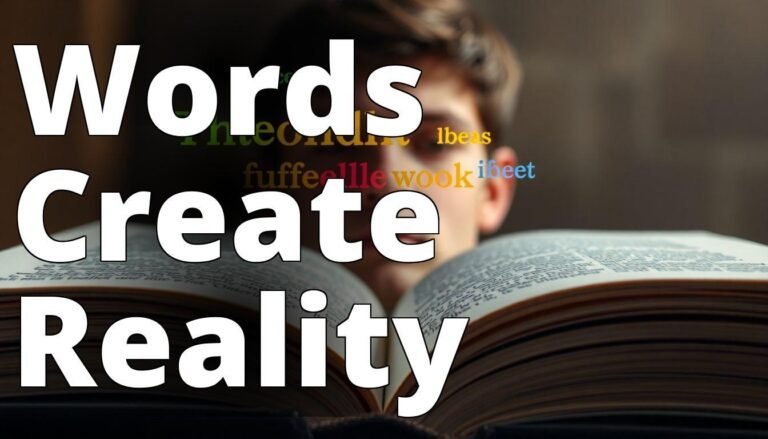How Words Shape Our Reality
Have you ever pondered how something as simple as words can wield such profound power over our reality? It’s almost as though words hold a supernatural ability to influence thoughts, emotions, and even the very fabric of our existence. This concept isn’t just a figment of imagination or a poetic exaggeration. In fact, the physics of the supernatural, an intriguing intersection of linguistics and psychology, offers a compelling explanation of how words shape our reality.
Consider this: when someone tells you a story, paints a picture with words, or even whispers a sweet nothing, how does it make you feel? That emotional response is not merely an internal reaction; it’s a transformation of your perception and, by extension, your reality. The film “The Banshees of Inisherin” by Martin McDonagh provides a darkly comic exploration of these themes, showcasing how communicationor the lack thereofcan redefine friendships and ignite feuds.
Understanding Word Influence
Explore how language impacts our perception and reality.
– Words can alter our thoughts and emotions, influencing our experiences and interactions with the world.
– The concept of linguistic relativity suggests that the structure and vocabulary of our language shape our understanding of reality.
– Positive and negative language can manifest different outcomes in our lives, demonstrating the power of words in shaping our realities.
The Power of Words
Words are not just symbols or sounds; they are powerful tools that can shape our perception and interactions with the world. In the quantum realm, the idea that observation can alter reality is a cornerstone principle. Similarly, words can act as an observation, changing the state of our thoughts and emotions. But how does this ethereal influence work?

Words as Emotional Catalysts
Before delving into the scientific explanations, lets explore a personal anecdote. I once received a letter from a friend during a particularly challenging time in my life. Her words, full of empathy and encouragement, transformed my bleak outlook into one of hope and determination. This wasn’t magic; it was the power of words at play.
Scientific research supports this experience. A study published in the Journal of Personality and Social Psychology found that words influence our emotions profoundly. Participants who were exposed to positive words exhibited a marked improvement in mood compared to those who were exposed to negative words. This phenomenon suggests that words can act as catalysts, triggering emotional responses that shape our reality.
Insider Tip: “Choosing your words wisely is more than just a social skill; it’s a tool for sculpting reality,” says Dr. Lisa Feldman Barrett, a renowned psychologist and neuroscientist.
Language and Perception
Words don’t just affect our emotions; they influence our perception of reality. The Sapir-Whorf hypothesis posits that language shapes our thoughts and perceptions. For instance, if a language has multiple words for a single concept, its speakers may perceive that concept more richly. Consider the many words for snow in Inuit languages compared to English. The varied vocabulary influences how speakers perceive and interact with snow.
In “The Banshees of Inisherin,” the characters’ wordsor their silencedictate their relationships and fates, illustrating how language influences personal reality. This aligns with scientific findings that language can, indeed, shape our cognitive processes. A study from Cognitive Science revealed that bilingual individuals perceive the world differently depending on the language they are using at the time, further supporting the notion that words shape our reality.
Thought-Provoking Question: How might your perception of reality change if you spoke a different language?
The Physics of the Supernatural
The intersection of physics and linguistics creates a fascinating narrative about the supernatural power of words. The notion that words can alter reality parallels the observer effect in quantum mechanics, where the act of observation changes the state of a particle. Similarly, speaking or hearing words can change our mental state.

Quantum Linguistics
Quantum linguistics is an emerging field that seeks to understand how language influences thought and perception at a quantum level. It’s a fascinating idea that the structure of language may align with the probabilistic nature of quantum mechanics. Just as particles exist in multiple states until observed, words can hold multiple meanings until interpreted.
For instance, in “The Banshees of Inisherin,” the same phrase can mean different things to different characters. This variability mirrors the uncertainty principle in quantum physics, where multiple outcomes are possible until one is realized. This concept is explored in a study from Linguistic Inquiry, which suggests that the ambiguity and context-dependence of language are akin to quantum superpositions.
Reality Shaped by Belief
Belief in the supernatural often hinges on the power of wordsthink spells, curses, and prayers. In essence, these are words believed to alter reality. The placebo effect, a well-documented phenomenon, exemplifies this power. When patients believe they are receiving treatment, their symptoms often improve, despite receiving a placebo. This is a testament to the mind’s ability to shape reality, influenced by the words and beliefs that guide it.
A fascinating case study from The New England Journal of Medicine demonstrated the placebo effect in patients with knee pain. Those who believed they had undergone surgery, but had not, reported pain relief similar to those who had the actual procedure. This illustrates the profound impact of belief, often cultivated through words, on our physical reality.
Thought-Provoking Question: If belief can alter physical reality, how much of what we perceive is shaped by the words and beliefs we hold?
Words in Culture and Society
Words also wield power in shaping societal norms and cultural realities. They can build bridges or erect barriers between communities, influencing collective perception and behavior.

Words as Social Constructs
Consider the role of words in defining cultural identities and social constructs. Words like “freedom,” “justice,” and “equality” are not merely abstract concepts; they are cornerstones of societal values and norms. The way these words are defined and used can shape entire societies.
Historical examples abound, such as the use of propaganda during wartime, where words were deliberately crafted to shape public opinion and national identity. In the same vein, the words of influential leaders have the power to inspire movements and change the course of history. Martin Luther King Jr.’s “I Have a Dream” speech is a testament to the transformative power of words in shaping societal reality.
Digital Age and Language Evolution
In today’s digital age, words have taken on new dimensions. Social media platforms and digital communication have transformed how words are used and perceived. The rapid spread of informationand misinformationillustrates the power of words to shape public perception on a global scale.
A study from Pew Research Center highlights the impact of digital communication on language and perception. The research found that online interactions often amplify emotional responses, demonstrating how words used in digital contexts can shape reality more intensely than ever before.
Thought-Provoking Question: How might the evolution of digital language continue to shape societal realities in the future?
Conclusion
Words, in their simplicity, hold a supernatural power that shapes our reality. From influencing emotions and perceptions to altering societal constructs and even physical realities, the power of words is profound and pervasive. Whether through the lens of quantum linguistics or the cultural narratives we construct, words remain a potent force in defining our world.
As we navigate a reality increasingly mediated by digital communication, it is crucial to recognize and harness the power of words. By understanding how words shape our perceptions and beliefs, we gain the ability to craft realities that align with our values and aspirations.
In the spirit of “The Banshees of Inisherin,” let us choose our words wisely, for they carry the power to alter destinies and define the contours of our lives. Embrace the supernatural power of words, and wield them with intention and care.
For further exploration of how language influences reality, visit this insightful resource.
Q & A
Who explores how words shape our reality in supernatural contexts?
Many physicists and linguists investigate this intriguing intersection.
What role do words play in shaping our perception of reality?
Words influence our thoughts, emotions, and interpretations of experiences.
How can language affect our understanding of supernatural phenomena?
Language frames our beliefs and expectations about the supernatural world.
What evidence supports the idea that words shape reality?
Studies show that language impacts cognition and perception significantly.
How can I apply this concept to my own life and beliefs?
You can consciously choose empowering language to reshape your reality.
Isn’t this idea too abstract to have real-world implications?
While it may seem abstract, many find practical benefits in positive language.







